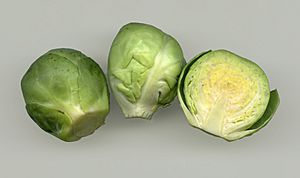Brussels sprout facts for kids
Brussels sprouts are a type of green vegetable that look like tiny cabbages. They are a popular food that can be used in many different recipes, like salads or roasted dishes. These small veggies have a lot of the same good things for your body as regular cabbage, including carbohydrates, fats, and proteins. When they are cooked, especially by steaming, they offer many health benefits because they are full of fiber.
Contents
What Are Brussels Sprouts?
Brussels sprouts are part of the Brassica oleracea plant family. This family also includes other well-known vegetables like broccoli, cauliflower, and kale. Brussels sprouts grow on a tall stalk, with many small, round sprouts forming along the stem. Each sprout is usually about 1 to 1.5 inches (2.5 to 3.8 cm) in diameter.
Where Do Brussels Sprouts Come From?
These tiny cabbages get their name from Brussels, the capital city of Belgium. They have been grown in Belgium for a very long time, possibly since the 13th century. They became very popular in Europe during the 16th century. Today, Brussels sprouts are grown in many parts of the world, especially in places with cool climates.
Growing Brussels Sprouts
Brussels sprouts are a cool-season crop. This means they grow best in cooler weather, often in late summer or autumn. The plants can grow quite tall, sometimes up to 3 feet (90 cm) high. The sprouts form in the leaf axils, which are the spots where the leaves meet the main stem. Farmers often harvest them from the bottom of the stalk upwards as they ripen.
Why Are Brussels Sprouts Healthy?
Eating Brussels sprouts is a great way to give your body important nutrients. They are known for being very healthy and can help you stay strong and well.
Important Nutrients
Brussels sprouts are packed with Vitamin C, which helps your immune system fight off sickness. They also have a lot of Vitamin K, which is important for healthy bones and blood clotting. Besides these vitamins, they contain dietary fiber. Fiber helps your digestive system work well and can make you feel full, which is good for managing your weight.
Cooking for Health
How you cook Brussels sprouts can affect how healthy they are. Steaming or roasting them lightly helps keep most of their good nutrients. If they are overcooked, especially by boiling for too long, some of the vitamins can be lost. Many people enjoy them roasted with a little olive oil, salt, and pepper. This way, they become slightly crispy and delicious.
How to Enjoy Brussels Sprouts
Brussels sprouts have a unique flavor that some people love and others need to get used to. They can taste a bit nutty and slightly bitter. The way they are prepared often changes their taste.
Popular Recipes
There are many fun ways to eat Brussels sprouts. They can be roasted until they are tender on the inside and crispy on the outside. They are also great when sautéed with bacon or garlic. Some people even enjoy them raw, thinly sliced in a salad. They can be a tasty side dish for many meals, especially during holiday dinners.
Taste and Flavor
The flavor of Brussels sprouts can vary. Younger, smaller sprouts tend to be milder. Larger sprouts might have a stronger, more bitter taste. This bitterness comes from certain compounds in the vegetable. However, cooking methods like roasting can help to reduce the bitterness and bring out their natural sweetness.
Images for kids
See also
 In Spanish: Brassica oleracea var. gemmifera para niños
In Spanish: Brassica oleracea var. gemmifera para niños
 | Delilah Pierce |
 | Gordon Parks |
 | Augusta Savage |
 | Charles Ethan Porter |




